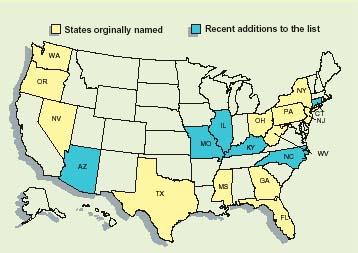Article
UPDATE: Focus on practice
Receiving gifts; Cigna suit; the uninsured.
UPDATE
Focus on Practice
By Joan R. Rose
California takes aim at drug companies' gifts to doctors
The Golden State wants to require pharmaceutical manufacturers to annually disclose to the State Board of Pharmacy their marketing activities to doctors. A bill introduced in the state Assembly would require companies to disclose the names of the recipients of gifts worth more than $25, as well as the reason for those gifts. (Drug samples would be excluded.) Companies that violate the disclosure requirements would be fined $10,000 for each violation, and violators would also face criminal charges.
Last year, the Pharmaceutical Research and Manufacturers of America adopted a marketing code of its own. Under the code, which is voluntary, gifts to physicians and other health professionals should be of benefit to patients and should be valued at no more than $100.
Cigna's end run around RICO fails
A federal judiciary panel has ruled that Cigna's attempt to settle a class-action suit brought by two Illinois physicians must be overseen by federal Judge Federico Moreno in Miami. For the past three years, Moreno has been presiding over a multidistrict class-action suit brought by more than 700,000 physicians against eight of the nation's largest health plans. Allegations in these cases are similar: that HMOs violated RICO laws in an attempt to control physician-patient relationships.
Last November, Cigna agreed to settle the Illinois suit, which would have precluded most of the claims against the company in the pending Miami case. Plaintiffs in that case cried foul, and Moreno issued an injunction to stop the settlement. He blasted Cigna's use of "underhanded maneuvers" in obtaining the Illinois settlement and said the company had "snookered" the judges in both cases in an attempt to avoid Moreno's jurisdiction.
A new tool to improve patient care
Want up-to-date, evidence-based measures to help evaluate and improve the quality of patient care? The Agency for Healthcare Research and Quality has launched the Web-based National Quality Measures Clearinghousea one-stop resource for physicians, hospitals, health plans, and others interested in quality measures (www.qualitymeasures.ahrq.gov ).
You'll be able to search for information applicable to a specific disease or condition, treatment, or intervention, and look for data by population, care setting, contributing organization, age, and gender. The system also enables you to do a side-by-side comparison of several quality measures to determine which best suits your needs.
HHS: The liability crisis is hurting patients
Americans' access to high quality care is threatened by the excesses of the civil justice system, according to an HHS report. Faced with higher costs for defending claims, and bigger judgments and settlements, insurers are raising premiumsand patients are paying the price in reduced access to care, government researchers say.
The AMA has issued a similar warning. Last summer, the association identified 12 states as areas where the current liability climate is adversely affecting patient care. Its most recent analysis found six more US hotspots.

The uninsured: Not who you think they are
More than a third of America's 41 million uninsured are eligible forbut not enrolled inprograms such as Medicaid and SCHIP (the state-run program that provides health coverage to needy children), according to the Blue Cross Blue Shield Association. Of these, 8.7 million are nonelderly adults who are Medicaid eligible, while 5.4 million are children under 18. Moreover, although a disproportionate number of uninsured are low-income individuals, more than 30 percent13.2 millionare middle-class, with income levels of $50,000 or more. Indeed, the fastest growing income segment of the uninsured is made up of people making $75,000 or more.
Our Web Poll

Joan Rose. UPDATE: Focus on practice. Medical Economics Apr. 25, 2003;80:12.





